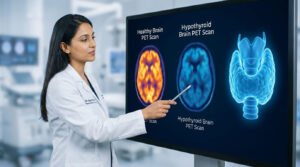One of the most vital hormone glands in the human body is the thyroid gland. It is instrumental in affecting aspects like metabolism, development, and growth of the individual. When the thyroid gland releases a consistently steady number of hormones into the bloodstream, it regulates several body functions. For example, there would be an increase in the hormones produced by the thyroid gland during pregnancy or if it is cold to generate warmth.
Aspects of Thyroid Functioning
It is imperative to know how well one’s thyroid is functioning as it is directly linked to one’s overall health. The three most important tests for this are – T3, T4, and TSH tests. The TSH or the thyroid stimulating hormone test is the broad screening test that may be potentially instructed to be carried out by a doctor if there are concerns about the functioning of the thyroid.
The TSH test measures the level of thyroid-stimulating hormone in one’s blood.
The TSH has a normal test range between 0.4 and 4.0 milli-international units of
hormone per liter of blood. The t3 t4 TSH tests are the most common ones used.
There are three main hormones that the thyroid gland produces. They are as follows:
• Triiodothyronine (T3). Factors like birth control pills or steroids may impact the same.
• Tetraiodothyronine (T4). Factors like birth control pills, drugs with estrogen or androgen may impact the same.
• Calcitonin
One of the fundamental building blocks of these hormones is Iodine. Iodine, however,
cannot be elementally produced in the human body. Thus, it needs to be generated via one’s
diet. Foods that help produce a healthy amount of Iodine are fish (such as cod and tuna),
seaweed, shrimp, and other seafood.
Apart from these dairy products like milk, yogurt, iodized salt, cheese, blueberries, tomatoes, bell peppers, and other such foods rich in antioxidants that improve overall health and benefit the thyroid gland are also important. When health-friendly food is consumed, sufficient iodine gets absorbed into the bloodstream via the food in one’s bowels. Calcitonin is instrumental in maintaining the levels of calcium and bone metabolism in the human body.
The base metabolic rate in humans is controlled by T3 and T4 . They ensure that
the cells work hard to maintain the hormonal balance. Hence the cells need an
increase in energy as well. When this occurs, there are certain side effects as well.
Some of them could be potentially seen as:
• The temperature in the body rises Body temperature rises
• There is a stronger heartbeat and faster pulse detected
• As the energy stored in the liver muscles is broken faster, food is used up at an accelerated pace
• In children, the brain is seen to mature at a faster pace
• There may be a growth spurt witnessed in children as well
• There could be faster reflexes and improved concentration due
to the activation of the nervous system
Thyroid gland – Overactive and Underactive
hyperthyroidism is the syndrome associated with an over actively functioning thyroid gland. This is when too many hormones are produced. Conversely, Hypothyroidism is when the gland does not produce enough hormones and there is a severe lack thereof. Either of these extreme conditions manifests themselves with certain symptoms and are not good for health.
In the case of Hyperthyroidism, some indications of this imbalance are characterized by weight loss, high levels of anxiety, tremors in the body, and a sense of being on a high. In the case of Hypothyroidism, the symptoms include weight gain, brittle hair and fingernails, fatigue, lack of energy, and possible depression. In this case, both T4 and TSH tests are usually conducted on newborns as if there is a consistently low-performing gland, this condition may potentially lead to learning or developmental disabilities.
Apart from this, one may also be affected by primary or secondary hypothyroidism. This is when the thyroid is unable to produce regular amounts of thyroid hormones. There is also a disorder known as thyrotoxic periodic paralysis. This is a result of excessively high thyroid hormones consequently resulting in muscle weakness.
Book Thyroid Function TestConsistent issues with one’s thyroid may also result in menstrual irregularities, constipation, weakness and fatigue, unnatural weight loss or gain, dry and puffy skin, sleep irregularities, hair loss, dryness or irritation in the eyes, and increased heart rate with palpitations. Whenever there is a Thyroid Function Test or a TSH blood test to be conducted, it must be administered professionally and not by an untrained individual. All three t3 t4 TSH; are the fundamentals on which rest the very foundation of one’s thyroid health
Maintaining Thyroid Health
As the famous adage goes “one is what one eats”, so does the human body
as a separate mechanism respond to what is purely consumed by it.
It is imperative to know what foods are needed to establish and stabilize
optimal thyroid health. Here are some of them:
• Iodized Salt – Being rich in iodine, the thyroid utilizes this to regulate hormones in the body
• Brazilian nuts – These contain an abundance of selenium which is responsible
for the metabolism of the thyroid gland as well as the antioxidant functions
• Sunflower Seeds – These also contain a high degree of selenium and are low
in calories as well. One of the best mid-meal snacks to munch on
• Seafood like sardines, tuna, salmon – These are filled with Omega 3 fatty acids
which aid greatly in boosting one’s Immunity. This in turn keeps the thyroid gland healthy
• Flax Seeds – Just like seafood, flax seeds also contain a high quotient of Omega 3 fatty acids.
These are also a great source of iron that helps in regulating oxygen to various organs in the body
• Low Fat Dahi (Yogurt) – This is a double whammy. Yogurt is loaded with iodine and Vitamin D.
Apart from being easily available at most places this is a pocket-friendly option also
• Eggs – Eggs consist of iodine, selenium as well as Omega 3 fatty acids making them a prime
option in terms of maintaining overall good health. However, even though it may be packed
full of nutrients, by themselves, eggs are not the cure for health concerns. It is vital to include
them in an otherwise balanced diet
Conclusion
A stabilized thyroid health goes a long way in establishing overall wellness. Even if one does not have a thyroid, one can still include the aforementioned foods and medical tests to help counter any adverse effects.








